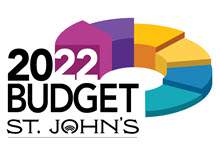Understanding City Budgeting

How does the City of St. John’s budget, and why should our budget matter to you?
If you live, work or do business in St. John’s – whether or not you own property – the City’s budget impacts you. Maintaining safe roads, providing water and sewer, waste collection, snow clearing, recreation, good urban planning and fire services – these are all the responsibility of your city. These services are necessary to keep the City running and make it an enjoyable place to live.
Our budget is our plan to ensure we can provide the services and programs you expect from the City of St. John’s in the most balanced, cost-effective and efficient way possible.
Watch the Video.
Budgeting for a large municipality is a complex process but is not unlike budgeting for your family.
Step one for the City is to figure out how much money is needed to provide services and operate effectively. Those are the expenditures. Step two is to determine how much revenue is needed to meet the projected expenses.
Think about your household expenses: you have a certain amount of revenue coming in as salary or savings or loans. All of your expenses for the year – rent, groceries, clothing, heat and light, gas, school programs and so on must all come from your “revenue” in order to have a balanced budget.
If your household expenses exceed your income you would be in debt. Provincial legislation requires municipalities to not have a deficit and also to submit a balanced budget every year.
Revenue Streams and Taxation
The City of St. John’s has a few different revenue streams, but most of our revenue comes from water and property tax -72% in fact. The remaining 28 percent of our budget comes from user fees for programs and services (like the cost of swimming lessons or renting a facility), permits, fines, and government grants and subsidies.
To figure out what portion of the cost to run the City each property owner pays, the City assesses all properties and comes up with a “mill rate” or multiplier. Although taxation affects us all differently, all residential property tax is calculated using the same method. To determine your tax bill, we multiply the assessed value of your home by the mill rate and add the water tax.
Each year, the City is allowed to set one rate for commercial property owners and one rate for residential property owners. Mil rates are set annually in December.
Budget planning is an integral component of our operations.
We know you want value for your tax dollar and greater input into the City’s decisions. Annually, the City provides opportunities for the public to engage with Council on the budget. Throughout the year we also gather your feedback on what matters to you most through citizen satisfaction surveys, advisory committees and just listening to your opinions on operations and planning.
Engagement on Budget 2022 will begin soon. Follow us on social media and register at engagestjohns.ca to be notified when our engagement process begins.
